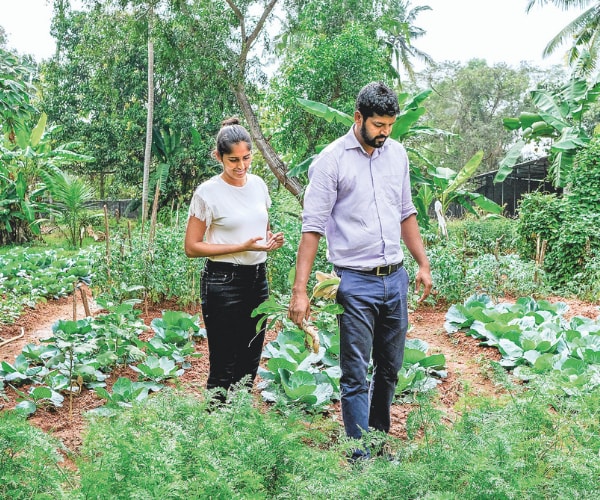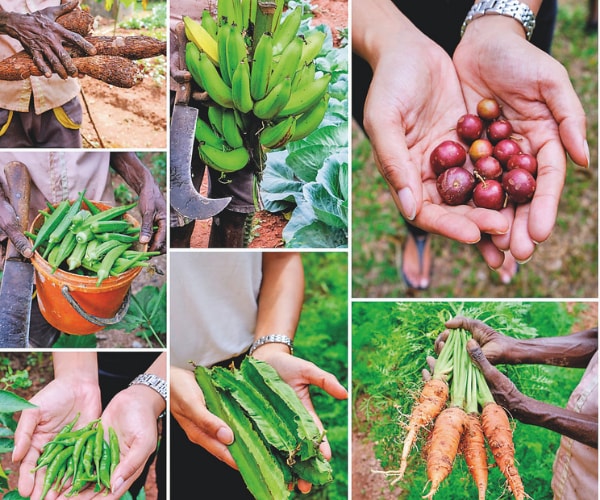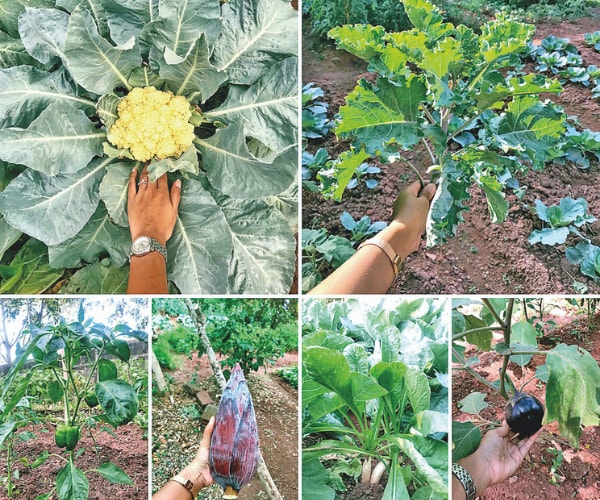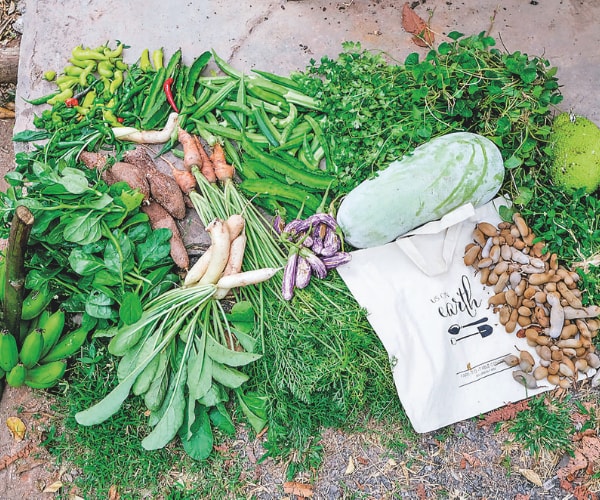
Jun 24 2021.
views 439The dialogue on organic farming and chemical-free food has taken a new dimension with the government’s move to ban chemical fertilisers and agrochemicals. Good quality organic fruits and vegetables have become a luxury in today’s context, but as far as your health is concerned, they are the best options. Upon realising the struggle to get their hands on fresh produce, Medhini Igoor and Abhishek Devraj decided to grow their own food. This is their story.

Tell us the story behind ‘Us on Earth’.
As consumers we struggled to get our hands on good quality organic fruits and vegetables, that was locally produced and also affordable. That’s when we decided to grow our own food. What started as a small vegetable patch grew into a 2-acre farm. We quickly realised that there is a huge demand for farm-fresh produce, and also a gap in the market when it came to farm-to-table businesses. That’s when we established Us On Earth as a business. We currently do deliveries of fruits and vegetables to our customers’ doorstep on a weekly basis. We also organise farm visits, especially for kids, mainly to bridge the gap between the farm and city life. We will be launching a CSA (Community Supported Agriculture) programme in the coming months, and are working towards a more regenerative practice at the farm.
How challenging is it to run an organic garden in an urban area with environmental issues such as pollution, floods etc.?
We have come to understand that there are very few areas where pollution and human interference is not a concern. Our goal is to make the best of the land that is available and also work towards rebuilding or enriching the soil and environment there. The process of establishing a good organic farming system in any area can be time-consuming and involves a lot of hard work, even in ideal conditions. So when you add events like floods or droughts the challenges just multiply.

What vegetables/fruits have you grown so far?
We grow a variety of local and seasonal fruits and vegetables. Most of our energy is focused on growing vegetables. We grow over 25 varieties in rotation throughout the year. This is interspersed with about 10 varieties of annual and perennial fruit trees.
Did you have to take additional measures to increase the yield given that the farm is in an urban area?
The land we use was filled with shrubs and greenery even before we started the farm, so we did not have to take additional steps to improve the growing conditions. But over time the soil does lose nutrients which directly affects the yield. We regularly add organic matter and compost to the soil along with animal manure. We also use neem oil extract as a pest repellant. We have started using no-till farming techniques, so over time the number of inputs needed will reduce.
Let’s talk about the microgreens concept. How did you come across this concept – what are the economic benefits and after how long can you harvest the produce?
Microgreens are basically young vegetable greens that are about 1–3 inches tall. They can be harvested between 7-14 days from sowing and have concentrated nutrient content. So not only are they great for your diet, but also convenient to grow. We have not started growing microgreens commercially yet.
What techniques have you explored when growing different varieties of plants on the land?
We have constantly evolved our farming techniques based on the changing conditions of the farm, and to adapt to our business model. We are now mainly focused on regenerative practices. We use no-till techniques for minimum disturbance to the ground and to preserve soil structure. We have integrated poultry to make our own compost and manure so as to reduce external inputs. We grow a variety of crops densely - this not only builds the soil but also improves the biodiversity of the farm as opposed to monoculture farms.

What challenges did you face when initiating the concept?
The biggest challenge was to figure out a viable business model that works for us, especially in the Sri Lankan context. There are very few small scale successful farms that we can turn to for guidance. We also spend a lot of time and effort to educate our customers and audience, which I think is a challenge most sustainable startups face here. A concern that is unique to our concept is communication with our farmers. We follow a lot of techniques and principles that are very different from what they have done all their lives. So for them, the process of unlearning and relearning can be overwhelming. And to find a system that works for us, the farmers and the farm can be challenging.
Now that the topic of organic farming is trending what tips can you give to those interested in growing vegetables/fruits at home?
The first step is to just start! The easiest way is to grow local varieties that thrive in the area that you live in - they grow well with minimum maintenance. For first time gardeners learning the basics before you start can be useful - like the best methods to grow different plants, the amount of water and sunshine required, care and maintenance, etc. Starting small with maybe one or two pots, and working your way into more varieties definitely helps.

How do you engage the local community to be a part of ‘Us on Earth’?
We look at engagement in two ways. First is with our customers and people who are interested in our concept. We are constantly active in sharing our journey, information, and ideas through our platforms. We try to bridge the gap between their urban settings and the farm by showing them how and where their food comes from. The second is the engagement or relationship we have with the local and farming communities. We currently only sell our produce to local shops at subsidised rates, but we hope to do more for the farming community as we go along.
Image courtesy: Us On Earth
0 Comments